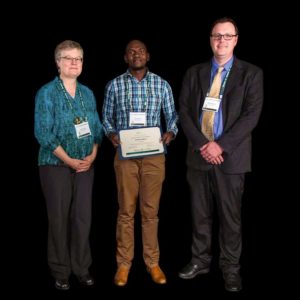Kwame Ogero awarded Best Poster Prize at the Emerging Technologies for Global Food Security Conference, June 2016 Home ⁄ Kwame Ogero awarded Best Poster Prize at the Emerging Technologies for Global Food Security Conference, June 2016
Kwame Ogero, a Regional Research Associate based in Mwanza, Tanzania, was awarded the best poster prize at the Emerging Technologies for Global Food Security Conference held in Saskatoon, SK, Canada on June 13 – 16, 2016. This was a double win for Kwame who had also received a full travel bursary from the organizers to participate in the meeting. The poster award was $ 500 (CDN) and a certificate.
The conference was co-organized by the Global Institute for Food Security (GIFS), Ag-west Bio and Agricultural Bioscience International Conference (ABIC). The theme of the conference was Mobilization to the Developing World and it aimed at highlighting successes in mobilizing discovery science to boost food security. It also sought to encourage young researchers to nurture a more global mentality. The conference speakers shared advances made towards addressing grand challenges of global agriculture including drought, flooding, salinity, diseases, plant nutrition and post-harvest losses. Awais Khan, Senior Scientist, Genetics and Crop Improvement, CIP Lima also attended the conference.

Kwame’s winning poster was entitled “Assessing Virus Degeneration of Clean Sweetpotato Planting Material maintained in Net Tunnels under farmer-management in the Lake Zone, Tanzania” and it highlighted findings from a research conducted in Mwanza, Tanzania from June 2014 to March 2016. The goal of this research was to determine how long insect-proof net tunnels can be utilized to produce clean planting material under farmer-multiplier management. It was part of a regional project “Support to Sweetpotato Production through Keeping Disease Free Sweetpotato Vines Closer to Farmers” (“Kinga Marando”), which operated in Lake Zone and Zanzibar, Tanzania, and Central Region, Uganda from May 2013 to April 2016. The project was funded by the Bill and Melinda Gates Foundation. The CGIAR Research Program on Roots Tubers and Bananas (RTB) also contributed some funds to the virus degeneration study through a project entitled “Developing tools for describing, quantifying and managing diseases causing degeneration of planting material in RTB crops.” Other CIP scientists involved were Margaret McEwan and Jan Kreuze.
The virus degeneration study showed that with good agronomic practices farmer multipliers should be able produce clean planting material using the net tunnels. It was conducted at two locations: Mwasonge (high virus pressure area) and Nyasenga (low virus pressure area) villages, Lake Zone, Tanzania. The high virus pressure site was an area where sweetpotato was intensely cultivated whereas the low virus pressure site had minimal sweetpotato production. There was no virus infection in the net tunnels at the low virus pressure area over the 21-month period of the study whereas planting material in one net tunnel at the high virus pressure area experienced minimal infections in the last three generations.
